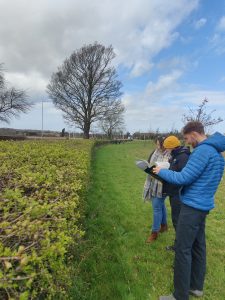2023 Awards Winner’s Spotlight: Higher Education Programme of the Year
MSc Conservation Management – Edge Hill University
This award was sponsored by:
For 15 years Edge Hill has been committed to developing in their students’ high-quality practical skills that are underpinned by sound ecological theory, to enable them to secure relevant conservation jobs and to take up leadership roles in the responsible management and protection of our natural capital. Employability is intrinsic to the curriculum, assessments, and opportunities on offer.

Since 2007 85% of course graduates secured employment within 12 months after completing the course with 89% of these within relevant graduate jobs. Key graduate destinations include ecological consultancy (32%), conservation NGO’s (29%), government conservation jobs (15%), research/academia (13%) and others (11%). Organisations that regularly employ Edge Hill graduates include Natural England, Wildlife Trusts, Centre for Ecology & Hydrology, National Trust, RSPB, Avian Ecology, Wardell-Armstrong and Atkins.
There is a strong emphasis on practical and field work so that graduates have strong skill portfolios. With over 25 days of fieldwork, plus a six-day residential field trip and 10-20 days of placement work at a relevant consultancy or conservation business, students learn-bydoing. Furthermore, it is important that students graduate not only with a MSc in Conservation Management, but also recognise the relevant skills they have for employment in the sector. The Placement module (MCM4006) incorporates an assessment based upon the CIEEM competency framework, where students use the self-assessment tool to reflect on their competencies. Students complete this work using Pebble pad, which allows them to continue their self-evaluation after graduation.
 Through the course teaching, students are directly exposed to practitioners to enhance their employability skills and gain a better understanding of what a career in the sector entails. For instance, on Vertebrate Monitoring and Management (MCM4008) students have a lecture on bat surveying and licencing from practising consultants at Wardell-Armstrong and meet conservation rangers from the National Trust and a local council, to find out directly how they apply knowledge in practice. On Restoration & Conservation Planning (MCM4015) students submit a 5-year management plan for a conservation site. Their work in 2021 & 2022 was included in the 5-year plan of Gorse Hill Nature Reserve. During the Management in Practice (MCM4011) residential trip to Worcestershire, each day sees students meeting conservation practitioners from a range of sites and organisations to explore different management questions (agriculture, forestry, water catchment etc.). All expenses of these trips are covered by EHU.
Through the course teaching, students are directly exposed to practitioners to enhance their employability skills and gain a better understanding of what a career in the sector entails. For instance, on Vertebrate Monitoring and Management (MCM4008) students have a lecture on bat surveying and licencing from practising consultants at Wardell-Armstrong and meet conservation rangers from the National Trust and a local council, to find out directly how they apply knowledge in practice. On Restoration & Conservation Planning (MCM4015) students submit a 5-year management plan for a conservation site. Their work in 2021 & 2022 was included in the 5-year plan of Gorse Hill Nature Reserve. During the Management in Practice (MCM4011) residential trip to Worcestershire, each day sees students meeting conservation practitioners from a range of sites and organisations to explore different management questions (agriculture, forestry, water catchment etc.). All expenses of these trips are covered by EHU.
Many of the course assessments are directly relevant and, in some cases, used to inform conservation efforts locally. In some modules, students have also the opportunity to sit additional examinations such as the Field Identification Skills Certificate (FISC) following the Field Botany module (MCM4014). Of the students that took the FISC in 2022, most scored between 3-4. The subject specific and transferable skills students develop from these assessments are directly relevant to future employment.
Since 2017, there have been six final Research Projects published in scientific journals in collaboration with external stakeholders. Many of these publications have resulted in direct positive conservation outcomes and benefited nature and people’s connection with nature. The University frequently financially supports students to present their work at relevant conferences.
We will be posting further information on each of the 2023 Awards Winners over on our blog.

